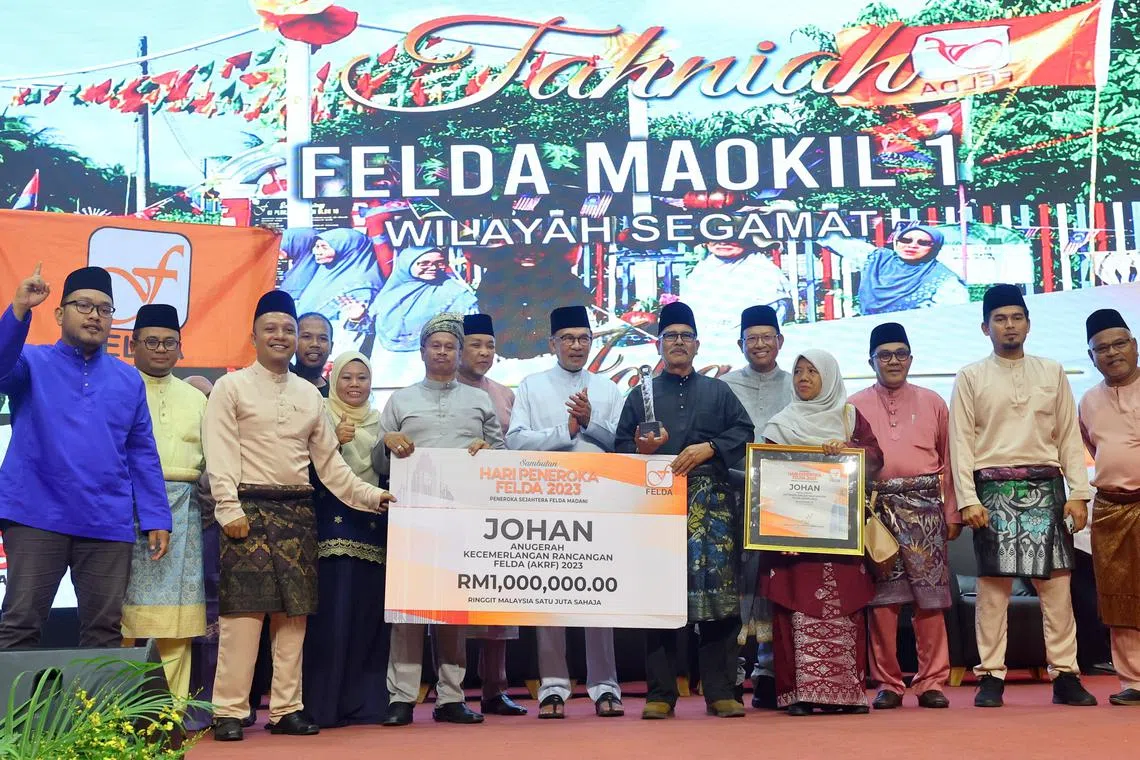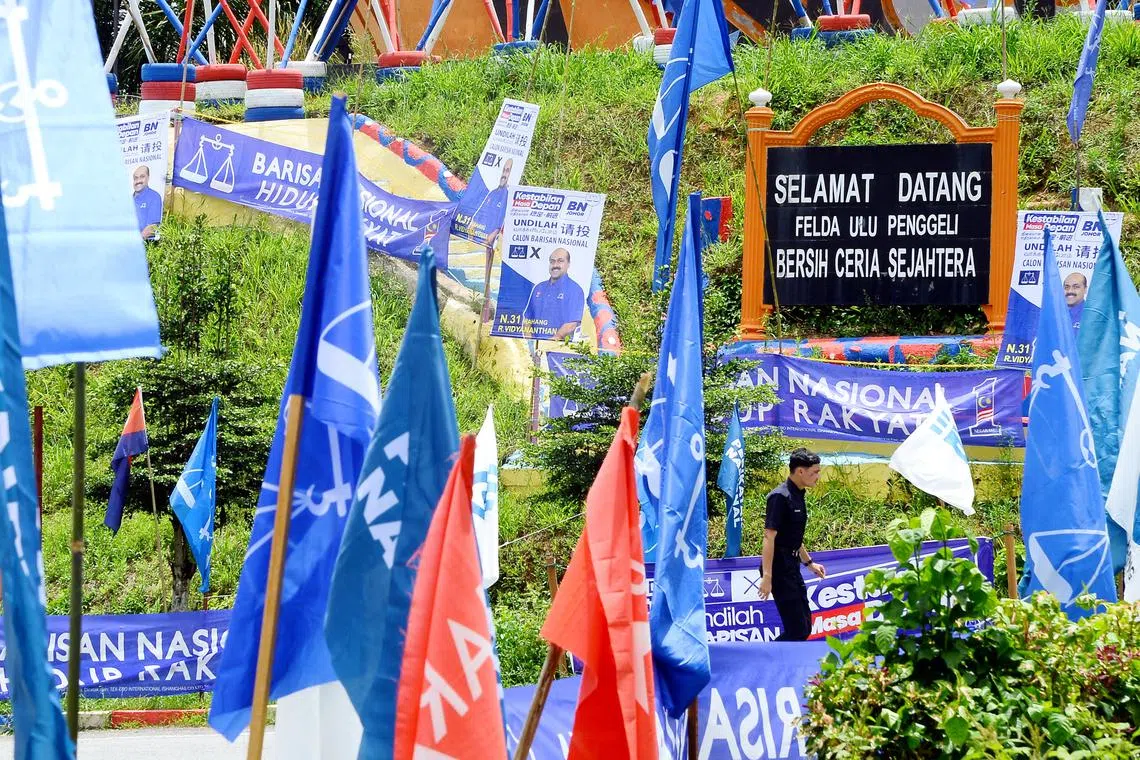Malaysian govt writes off $2.4b of Felda settlers’ debts, with eye on votes
Sign up now: Get insights on the biggest stories in Malaysia

Malaysian Prime Minister Anwar Ibrahim said that the government is restructuring Felda’s finances to make them stronger.
PHOTO: BERNAMA
KUALA LUMPUR – The Malaysian government is writing off RM8.3 billion (S$2.4 billion) of debts held by land settlers in Felda plantations, as Prime Minister Anwar Ibrahim moves to boost support among rural Malays ahead of the Aug 12 elections involving six states
Helping to reduce debts in the Federal Land Development Authority (Felda) resettlement schemes is an important target for Datuk Seri Anwar as Umno, a key member of his unity government, is struggling to retain Malay support.
Mr Anwar said on June 28 that the government is restructuring Felda’s finances to make them stronger, and this would include “the abolition of 80 per cent of settlers’ loans worth RM8.3 billion”.
On Thursday, the Premier issued documents to show that he signed the government-guaranteed sukuk (Islamic bonds) on June 26, as well as a RM990 million payment instruction to Felda for the redemption of its sukuk for 2023 on Tuesday. The government will provide RM990 million annually for 10 years.
He did this after opposition alliance Perikatan Nasional (PN) chairman Muhyiddin Yassin claimed that the debts of the settlers, who are farmers working for Felda, were written off during his tenure as prime minister in 2021.
Part of the debts were accrued by Felda farmers when they borrowed extensively to participate in the 2012 listing of Felda Global Ventures, now renamed FGV Holdings. The then Umno government had promised good returns, but most of the investments resulted in losses.
The claims and counterclaims on who is helping the Felda settlers and their descendants – who total some 1.5 million voters nationwide – reflected the bitter fight for votes between the ruling Pakatan Harapan (PH) government led by Mr Anwar and the Muhyiddin-led opposition.
Felda on Thursday said the commitment to waive settlers’ debts was implemented on paper in 2021 and 2022.
It received the government grants of RM990 million in July this year, to be paid out annually for 10 years, from Mr Anwar to carry out the write-offs.
“Basically, Felda didn’t have the funds to write off the settler’s debts back in 2021 and 2022, so it was done on the books and the debt amount was to be borne by the government. There was no allocation then by the government. Now, the Anwar-led government has approved the funding via a government-guaranteed sukuk issuance programme,” said Sunway University economics professor Yeah Kim Leng.
Felda voters form a bloc of rural Malay heartlanders who are often wooed ahead of major elections.
Felda was formed in 1956 by Tun Razak Hussein, who was prime minister from 1970 to 1976, to help poor Malays own land and raise successful plantations, essentially converting farmers into a vote bank for Umno.
Five out of six states holding their state assembly elections on Aug 12 have Felda land schemes, which mostly comprise small land holdings planted with palm oil and rubber.

Flags of various political parties displayed at the entrance of Felda Ulu Penggeli in Kluang.
PHOTO: THE STAR/ASIA NEWS NETWORK
Electoral reform group Tindak Malaysia estimates that the proportion of Felda voters in the five states ranges from 0.4 per cent in Selangor to as high as 11.7 per cent of Negeri Sembilan.
Negeri Sembilan, Selangor and Penang are currently held by Mr Anwar’s PH coalition. Penang is the only state without Felda settlements.
Having received low support from Malay voters in the November 2022 general election
PH won 13 per cent of the Malay vote eight months ago, while Barisan Nasional won another 32 per cent, said Dr Bridget Welsh from the University of Nottingham Malaysia in her preliminary analysis.
In contrast, the opposition PN coalition led by Parti Islam SeMalaysia and Malay-based Parti Pribumi Bersatu Malaysia received 54 per cent of the total Malay vote last November.
The allies in the unity government hope to gain ground in three rural Malay states held by PN: Kedah, Terengganu and Kelantan.
“The Anwar-led government probably figured that it can have a chance in Terengganu and Kedah by playing up the Felda settlers debt,” said Mr Halmie Azrie Abdul Halim, a senior analyst at government regulatory affairs and political risk consultancy Vriens and Partners.
“Mr Anwar purposely said this so close to the elections to try to help Umno, a partner of the unity government, win Malay support, which they desperately need.”
However, Umno’s popularity has waned markedly following the 1Malaysia Development Berhad corruption scandal
The rise of other Malay parties has also diluted the Umno strongholds, said BowerGroupAsia director Arinah Najwa.
In the November 2022 general election, Umno won in just 15 of the 53 constituencies with Felda communities.
This was a sharp drop from the 26 Felda seats it won in the 2018 elections, and 47 in 2013.
Support for PN also remains strong as the coalition is on the ground in Felda areas in both states, said Ms Arinah of BowerGroupAsia.
“PN is seen as more relatable on race and religion issues for Felda farmers. A strong factor to sway the votes would be how the government is seen as protecting the needs of the communities, especially the needs of the Malay majority community,” she added.
In last November’s general election involving federal constituencies, Felda voters were swayed in Kedah and Terengganu, with an average of over 55 per cent of the votes going to PN, said Ms Khor Yu Leng, political economist at Segi Enam Advisors.
An average of 78 per cent of Felda voters also cast their votes for PN in Kelantan in the November polls, she said.



